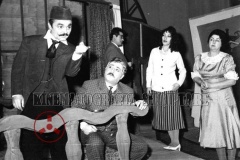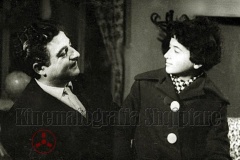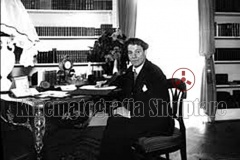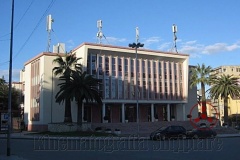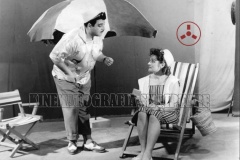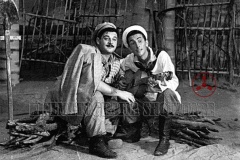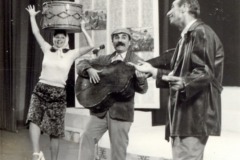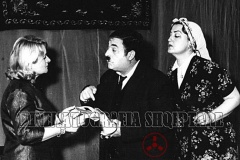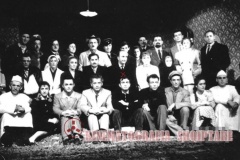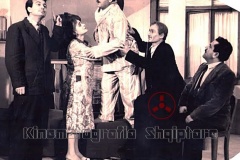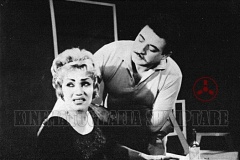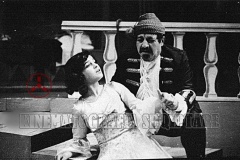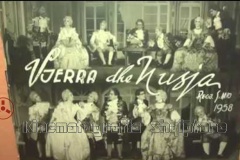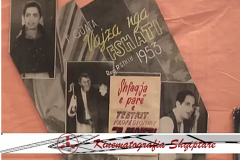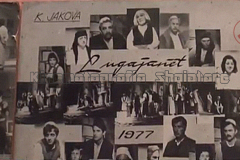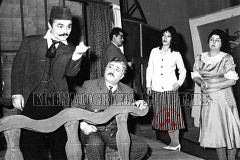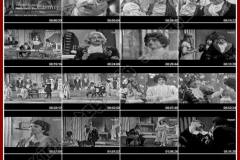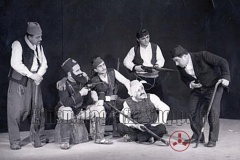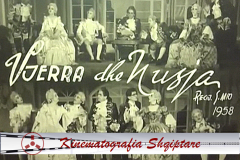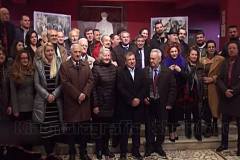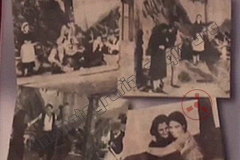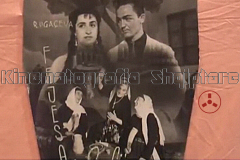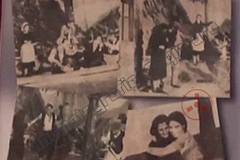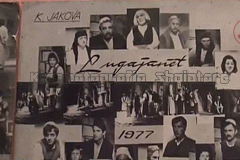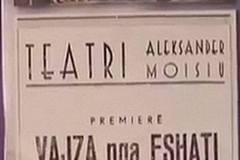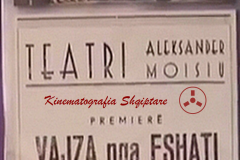“Aleksander Moisiu”, Theater of Durres!
January 11 of this year marks the 72nd anniversary of the establishment of this art institution (1953-2025).

The theater institution of the Durres city staged various works of the drama genre: tragedies, dramas, comedies, farces, etc. This building is located in the center of the city, built on archaeological ruins, which serve as a museum. The capacity of the hall is 300 seats, with two boxes at the end.
After the year 2000, several reconstructions were done in this building, especially in the internal environments, the audience hall, the studios, the complementary environments, the lobbies.
Theater “A. Moisiu”, inherited the traditions created by the city’s Amateur Movement, both during the years of National Renaissance, Independence and especially after World War II.
In the period of 1920-1924, artistic societies “Vllaznia”, “Durresi”, “Teuta” etc. operated in Durres. which can be staged dramas by S. Frasheri, Kristo Floqi, Mihal Grameno, Foqion Postoli as “Besa”; “Karlo Topia”; “Flower of memory” etc.
With the performance of “Ali Pashe Tepelena”, the theater group of the artistic society “Teuta” won a prize at the meeting of amateur theaters in Tirane in 1930. Performances of the drama “Enemy of the People” by H. Ibsen, the comedy “I ligu per mend” by Moliere are also worth it.
The state policy for the expansion of the network of professional theaters, as well as the growth and organization of the activity of the central theater group near the city’s House of Culture, led to the creation of the professional theater of Durres on January 11, 1953, with 14 actresses, being responsible for after the People’s Theatre, the “Migjeni” Theater in Shkodra and the “A.Z. Cajupi” Theater in Korce.
Among the main actors of this Institution were: Nikolin Xhoja, Koste Lezha, Meropi Xhoja, Lazer Murati, Teodor Rupi, Todi Thanasi, Spiro Urumi, Vera Urumi, Ferial Alibali, etc.
The inaugural premiere was Fatmir Gjatas’ comedy “Vajza nga fshati”, shown on April 12, 1953. This comedy was staged by the director of the “teatri Popullor” Pandi Stillu, as a guest who was warmly welcomed by the audience.
In 1954, the troupe staged the now well-known comedy “The Prefect” by Besim Levonje, which had a sensational success in the “Teatri Popullor” with Mihal Popi as the protagonist palying Q. Mulleti, but which had also been played by the amateur theater group 5 years earlier at the “House of Culture” of the city.
The premiere marked a well-deserved success, thanks to the rare comic talent of the well-known actor Nikolin Xhoja, who with his special organicity, the unique form he gave to the character, the play with the dialect and expressive subtleties, made this show remained in the theater repertoire for a long time, until it was put back on stage in 1968.
In 1955, the comedy “Marriage” by Nikolaj Gogol directed by Pano Koles was welcomed, who stood out for the careful work he had done with the actresses: N. Xhoja, V. Urumi. S. Urumi, T. Thanasi, etc., for creating some original and unique types. In this year, the drama “The Fisherman’s Family” by S. Pitarkes and directed by P. Koles was shown.
The show brought strong emotional flows, which, in some cases, even exceeded the goal, creating excessive anxiety, especially in the line of Sheje, Vehip, etc. Among the most prominent, artistically realized figures were Petriti by Vangjel Hebe, Selimi by Spiro Urum, Shazua by Kole Tafil, Vehipi by Todi Thanasi, the mother of Meropi Xhoje, etc. The show was held in high tones, created deep emotions, so careful work was done for the cultured game, against sentimental effects, measuring the creation of a unified ensemble and style.
“Foreign Votra” (1956) by Ndreke Luca, “Dredhite e Skapenit” (1957) by Moliere, “The Bride and Mother-in-Law, the comedy “Lottery Ticket” (1964) by Dionis Buban, “The Engagement” by Cekhov, “Mirandolina” of Goldoni, “A lost letter” by Jon Luka Karagiale, “Honor of the family”, “A stormy night” etc. will be some of the performances of v. `50s.
In the 60s, the theater “A. Moisiu” adds to the efforts to avoid amateur phenomena as well as to raise the artistic level, thanks to the experience already created, to the help given by the directors invited by the “Teatri Popullor”, but also to the completion of high art schools or qualifying studios near the “Teatri Popullor”, from actors such as Vangjel Heba, Haxhi Rama, Milto Profi, Lutfi Hoxha, Kadri Pirro, Guljelm Radoja, Ali Bega, Mirush Kabashi, etc.
The drama “Deep Roots” by James Gow and Arnold D’Yso was staged by the director Misto Zoto (1962), which dealt with the problem of racial discrimination in America through a harsh social-political collision.
The plays followed: “Over the ruins / Mbi germadha” by Fadil Pacrami (1963), “The Gull / Pulebardha” by Cehov (1964), “Detours / Ruge te terthorta” by Qamil Buxheli (1965).
Little more than a documentary and pathetic drama, the drama “Flamur ne dallge” by Besim Levonja dedicated to the death in the line of duty of Adem Reka, a “vincier” in the floating bay of the port, creates a living communication with the public about the politically manipulated situations of the time.
The drama “People on the rock / Njerez mbi shkemb” by K. Pirros (1968) beat a problem of the time on the so-called “technical-scientific revolution” in a geological sector: the ratio of technical intelligence to the mass of workers, according to the prevailing literary clichés, where “mass” he had to dictate and educate those who didn’t believe!… It was successful and was one of the shows that has stayed the longest in the repertoire, being performed over 100 times.
A year later, the comedy “Prinder edukatore” or “Two , zero” / Dy me zero” by Spiro Comora (artistic director Pandi Stillu, director Vangjel Heba) was released, which brought a lively and cheerful atmosphere, thanks to the quality performance of Nikolin Xhoja in the role of Aristotle. .
In 1969, the drama “The Mill of Koste Bardhi / Mulliri i Koste Bardhi” by Naum Prifti was staged, a play with dramatic tones and fierce conflict, where Spiro Urumi in the role of the miller Koste and Todi Thanasi in the role of Socrates, who came to stand out for their passionate interpretation from long emigration.
In the repertoire of the theater “A. Moisiu” have also found reflection in many dramas from the past of the Albanian people, for its outstanding personalities, among which: “Beyond love” a dramatization of the poem; “Serafina Topia” by Jeronim De Rades from Dashnor Kokonozi, which brings a dramatic episode of love and patriotism from the Skanderbeg period, and the drama “Albanian Alliance” by Sulejman Krasniqi.
The second one appeared on November 29, 1978, included in the 100th anniversary of the Albanian League of Prizren. The show creates a historical picture of the connection between the word and the organization of the Albanian war against the Turkish invaders. The protagonist of the drama was Abdyl Frasheri, played with pathos and drama by Vangjel Heba, with Sulejman Vokshi supporting him, interpreted by Spiro Urumi. In this continuation, the drama “Braid of Wars / Gersheti i luftrave” was also prepared, which raised the figures of Azem and Shote Galica in their struggle for freedom and the center, performed respectively by V. Heba and Liri Lushi.
In 1972, the drama “The case of engineer Saimir / Ceshtja e inxhinier Saimirit” by Fadil Pacrami directed by Mihal Luarasi was staged, a bold drama, which was celebrated for its critical spirit towards the state bureaucracy and intellectual mediocrity.
From the successful performances of 1970s, there was the comedy “Yellow Card / Kartela e verdhe” by Haxhi Rama (1975), where Mirush Kabashi excelled in the role of Teli, the football fan, who followed behind the scenes and “forgot” his duties of work. The subject and vicissitudes of this comedy continued with its sister “Player No. 10 / Lojtari me numrin 10” (1980) which, although well received, did not have the same sensation as the first one.
The comedies “Welcome Elona / Mireserdhe Elona” (1981) and “The Flight of the Tortoise / Fluturimi i Breshkes” (1985) would come from this author and director.
In the category of dramas that captured ethical and moral phenomena, mainly those related to family relationships and the concept of love, often set in a social context, there was the drama “Vransire e shkurter” with the title “Dorina” by Teodor Lacos, while from the plays aimed at female and adolescent ages was the drama “Zani partizani” by Naum Prifti.
From the foreign dramaturgy, the comedy “The Imaginary Sick” (1980) by Moliere directed by Enver Plaku stood out. In 1986, Mario Ashiku came to this theater as a director, who staged several works, among them “Leprosy”; the comedy “The Shadow of the Other” by R. Pulahaes, while in v. 1989 staged the comedy “Ylli pa emer” by Mihal Sebastjani, with Mirush Kabashi in the role of Marin Mroju.
The work was treated with a lyrical-poetic tone, but without ignoring the comic situation, highlighting the fate of a beautiful, but impossible love, in an atmosphere of overwhelming mediocrity and provincialism.
Arben Imami brought lessons in contemporary directorial and theatrical language with the drama “Peshperitje ne shtepine e Matildes” (1989).
It should be mentioned that during the 1970s and 1980s, the troupe of the “Aleksander Moisiu” Theater would be enriched with other actors, who showed a clear artistic individuality during their journey, such as Hysen Bashkhysa, Pellumb Decolli, Liri Lushi, Violeta Deda from Shkodra, Drita Nikolla, etc.
At the end of the 80s, this theater reached the largest number of actors, about 32, while after them, unlike in all other theaters in Albania, its troupe was reduced to sensitive way.
Today, united with the variety show, it consists of 8 actors. Repertoire in the 90s onwards, has changed noticeably. Now it became almost impossible to come to the stage of dramas with many characters and masses of extras, epic plays and epics. It was aimed at performances with few characters and with a minimum of expenses in decor, costuming, props, etc.
Some famous world authors, once banned, come to the scene. The treatments of the subjects were redeemed.
Helping in the re-identification of this theater, after a hiatus of more than 10 years, is the young director Driada Dervishi, who has staged several plays such as “Thieves running through DP” by Dario Fo, “Te jesh nene”, “Vajza pa prike” by N. Ostrovsky, “Tango” by S. Mrozek.
Also, the playwright Bashkim Hoxha has been present in the dramas “Dashuri me korbat”, “City without love”, “When Margarita sings”, etc.
___________________
Albanian Cinematography in activity in 2013
Reference: History of Albanian theater 2 (School Book Publishing House – Tirana 1985 p. 163-166) / Currents of pre-professional theater (Academy of Sciences, Art Studies Center – 2004 p. 143, 146-149); The memory that does not sleep (writings about theater and other arts – “Vatra” Publishing House – Tirana 2006 p. 129-131 / as well as Albanian Theater and Cinematography Encyclopedia – J. Papagjoni (2009)
Follow us: Blog: https://albaniancinematography.blogspot.com/ Vimeo: Albanian Cinematography (vimeo.com) Facebook: https://www.facebook.com/ksh.faqjazyrtare Dailymotion: https://www.dailymotion.com/kinetografiashqiptareartisporti YouTube: https://www.youtube.com/channel/UCDRYQ5xCyGkfELm3mX8Rhtw
Discover more from Albanian Cinematography - Sport
Subscribe to get the latest posts sent to your email.

